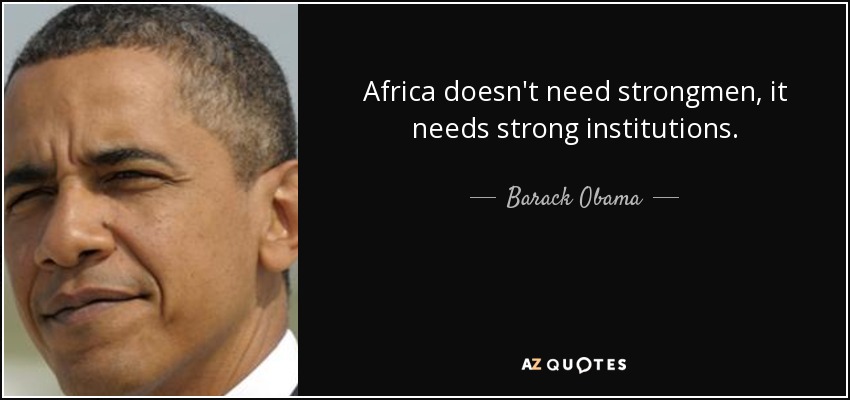“Gentlemen, the vote is 11 to 1 and 1 has it”. That is the iconic statement credited to Abraham Lincoln to his cabinet on a policy issue that is now used as the all time demonstration of the strong or powerful leader whose one vote overwrote that of eleven others. It is probably the type the late Chinua Achebe had in mind that made him conclude that the trouble with Nigeria is leadership failure. It used to be the stuff until Barack Obama came with his idea of strong institutions rather than strong individuals as what Africa needs to get out of doldrums.

Prof Jega

Prof Eghosa Osaghae
Even if Professor Attahiru Jega did not become the Chairperson of Nigeria’s Independent National Electoral Commission, (INEC) or Prof Tijani Bande were not the Permanent Representative of Nigeria to the United Nations and Prof Eghosa Osaghae were not a multiple tenure Vice-Chancellor of one of the earliest privately owned universities in Nigeria, each of them would still rank high among intellectuals of statecraft in Nigeria. While Jega and Bande are political economists, Osaghae is in comparative politics. They are all, therefore, at home with the slippery theme of the role of individuals and of institutions in democratisation. Interestingly, from each has come a statement on the issue, producing an unorganized consensus that must command attention.
One of Jega’s statements in his interview with Africa Review Today, snippets of which have already been published, at least on this medium, (as at yesterday afternoon), is where he said “I firmly believe that strong institutions can minimise the impact of transgressions by individuals. We have tried to build INEC as an institution that can function fully and effectively regardless of who is in charge”. By the statement, he was voting for strong institutions as a critique of the popular appeal of the charismatic, heroic leader as the nation builder in Africa in particular. On September 23rd, 2017, Prof Tijani Bande, Nigeria’s Permanent Representative to the UN declared that the way out of underdevelopment is creating and building strong institutions.
There is no such thing as a purely political or apolitical statement but even then everyone knows that neither Jega nor Bande is a politician in that sense of the word and their statements have more intellectual or academic connotations than anything else. It is even more in the case of Prof Eghosa Osaghae who has remained an academic, far away from politics. In his own case, the journal article from which his position is being extracted was published as far back as 2010. Not surprisingly, however, he agrees with both Jega and Bande on the primacy of institutions as opposed to charismatic authority.
Titled “The Limits of Charismatic Authority and the Challenges of Leadership in Nigeria”, Osaghae went far, tracing the phenomenon of endless demand for heroic, messianic, strong, outstanding and extraordinary leadership qualities for leadership materials to the rising expectations that defined anti-colonial politics. In the process, “opposition politicians, military adventurists, revolutionaries, strong men and warlords capitalised on frustrations to impose themselves in the name of delivering strong and redemptive leadership”
But he says it would never work because, among other reasons, personal or heroic qualities are only necessary but not enough for good leadership and two, the focus of elite politics, at least in Nigeria, is about the privatisation of the pursuit of power. In other words, the problem is with what he calls the domain of elite and elite formation and of which both leadership and the state are derivatives. So, he concludes on a note of elite’s lack of the capacity to motivate and drive provision of leadership on the terms of charismatic legitimation. For this reason, he advocates moving away from obsession with charismatic legitimation to institution building.


Prof Tijani Bande
This is the basis for saying that there is a consensus among all the three top political scientists, though unorganised in the sense that each came to his own conclusion independent of the other. But what nation can ignore the consensus of three of its topmost political scientists on such an issue! It is not a matter of whether one likes the consensus or not, it is that there is such a consensus. It is also not that the consensus is problem free. For, although all three political scientists have been involved in building institutions – Jega in INEC, Bande in NIPSS and Osaghae at Igbinedion University and before that, at the Programme on Ethnic and Federal Studies, (PEFS) at the University of Ibadan but the three haven’t told us who will be building the institutions they are talking about. Not many of us would become VCs, National Chairmen of INEC or DG of NIPSS. Secondly, while former President Obasanjo would be rated as an institution builder – EFCC, Independent Corrupt Practices Commission, FERMA, etc he has been a loner as far as institution building in Fourth Republic leadership is concerned. So, consensus yes but who does it? There is also the point that the late Singaporean leader, Lee Kuan Yew, made about the primacy of charismatic leadership for creating agricultural surplus to get the industrial sector off the ground and achieve the transition from an agricultural to industrial society.
Three top Nigerian intellectuals of power, all looking at one issue from a same lens over time, would tend to serve as some early warning on leadership recruitment and institution building in a way that overwrites or overtakes what Yew was talking about in 1991. Or, could there be a different way of reading this consensus?




























